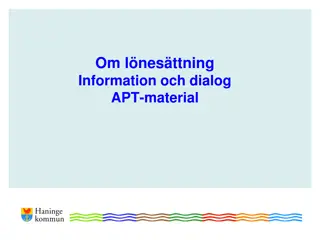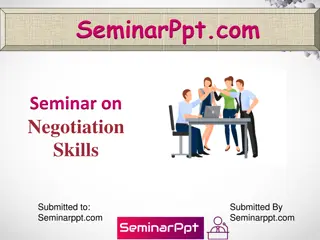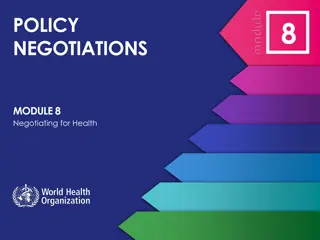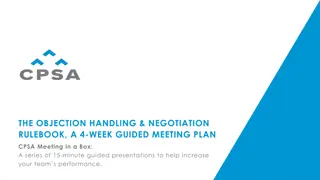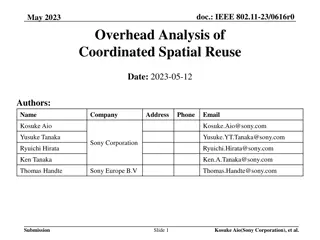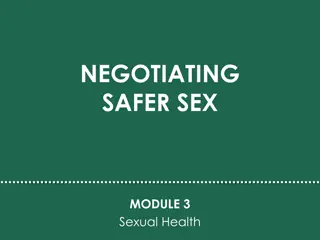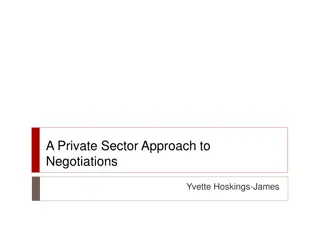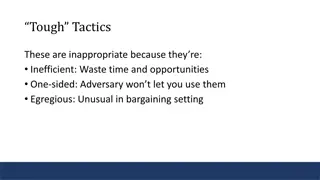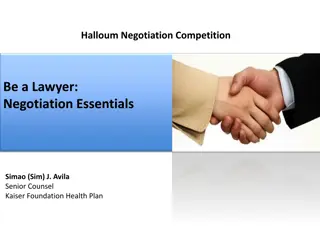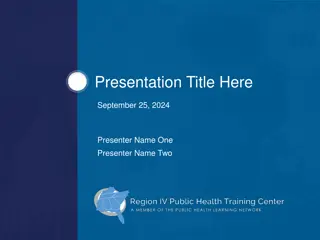Strategies for Effective Negotiation in Public Health
Understanding the principles of negotiation is crucial in public health settings. Negotiation involves parties with convergent or divergent interests engaging in a process to reach mutually beneficial outcomes. Key aspects include clarifying interests, identifying options, creating deal packages, and ensuring all parties are satisfied with the agreement.
Download Presentation

Please find below an Image/Link to download the presentation.
The content on the website is provided AS IS for your information and personal use only. It may not be sold, licensed, or shared on other websites without obtaining consent from the author.If you encounter any issues during the download, it is possible that the publisher has removed the file from their server.
You are allowed to download the files provided on this website for personal or commercial use, subject to the condition that they are used lawfully. All files are the property of their respective owners.
The content on the website is provided AS IS for your information and personal use only. It may not be sold, licensed, or shared on other websites without obtaining consent from the author.
E N D
Presentation Transcript
Public Health Summer School 8. Negotiating for Health Carmel Williams, Manager Strategic Partnerships Public Health Services SA Health otago.ac.nz/uowsummerschool
Negotiation Negotiation Definition Negotiation is a process by which two or more parties seek an agreement to establish what each shall give or take, or perform and receive in transaction between them. Saner 2011 It is a process of making joint decision when parties involved have different preferences, interests and drivers. Many approaches to negotiation
Principles of Negotiation Principles of Negotiation Two or more parties Convergent or divergent interests Voluntary relationships Distribution or exchange of tangible or intangible resources Sequential, dynamic process Incomplete information Alterable values or positions as affected by persuasion and influence
Negotiation Dance Negotiation Dance
Negotiation Dance Negotiation Dance
Negotiation Negotiation Outcomes Outcomes
HiAP HiAP and Negotiation and Negotiation Health in All Policies requires a negotiation strategy that looks for win- win (co-benefits) or Value Added Approach. Not zero-sum-games with win-lose outcomes.
Value Added Negotiation Value Added Negotiation Clarify interests Know and understand what you want and what the other parties want out of the deal Identify options What are the tangible and intangible assets that can be traded Create at least two or more Deal Packages Multiple deal opportunities Sell the deal and ask the other side to select one Discuss and the deal packages different benefits/ trade offs in the deal packages Perfect the chosen deal Are all parties happy?
SA SA HiAP HiAP and Diplomacy and Diplomacy Flexibility and Responsiveness Working within the time constraints, policy context and organisational structure of our partners Using different methodologies according to organisational needs Recognition and Mutual Respect Working with the existing skills and knowledge within partner organisations Sharing recognition for outcomes within partner organisation s spheres of influence and with state and international audiences Support and Resources Providing knowledge and expertise Accessing and brokering expertise Assisting in establishing government networks Facilitating the HiAP process and equipping organisations with the tools and processes to achieve their aim
SA SA HiAP HiAP and Diplomacy and Diplomacy Outcome-Focused Increasing political support for organisations Providing evidence-based solutions Documenting the process and outcomes according to organisational needs Clarity and Collaboration Ensuring respective roles and responsibilities are clear Working on the partnering organisation's policy agenda Modeling consultation and clear communication Taking on joint ownership of the work Following through on commitments
Ethical Negotiation Ethical Negotiation Ten tips to ensure win- win outcomes 1. Know what is not negotiable 2. Be honest 3. Keep your promises 4. Have multiple options 5. Be willing to say no 6. Be familiar with the law 7. Go with your gut 8. Practice the concept of no surprises 9. Follow the platinum rule 10.Be prepared to walk away from a deal The Negotiator magazine 2003 Peter B Stark and Jane Flaherty


